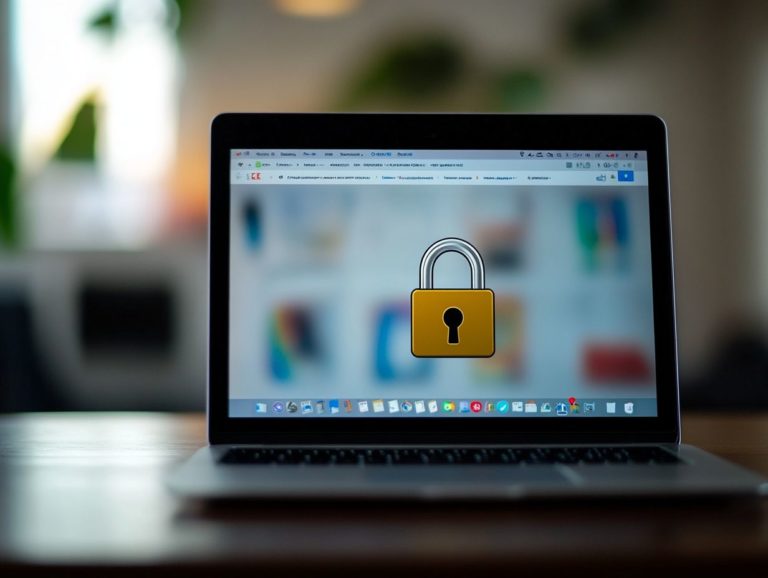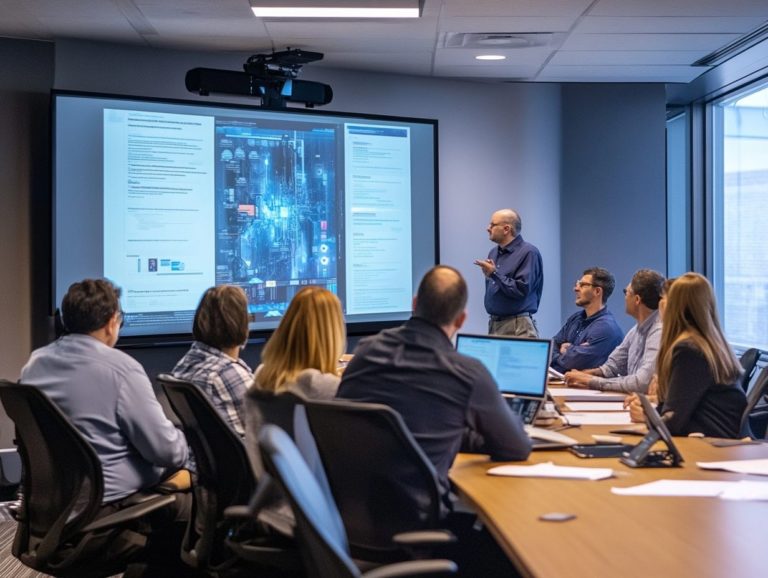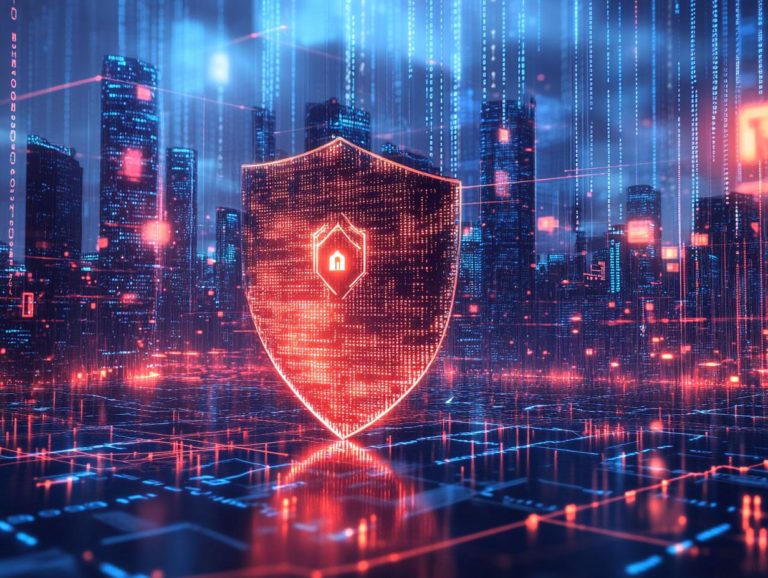what are the risks of using public wi-fi?
Public Wi-Fi is your gateway to seamless digital connectivity. It offers the convenience and access you crave in cafes, airports, and other public venues.
While tempting for quick online access, it’s crucial to understand the benefits and risks that accompany these networks. This article explores the advantages of using public Wi-Fi, from significant cost savings to effortless accessibility, while also highlighting potential security threats and privacy issues.
You’ll discover essential best practices to safeguard yourself and explore reliable alternatives for internet access when you re on the move. Don’t wait! Learn how to stay secure on public networks today!
Contents
- Key Takeaways:
- Understanding Public Wi-Fi
- Benefits of Using Public Wi-Fi
- Risks of Using Public Wi-Fi
- Security Threats
- Privacy Concerns
- How to Protect Yourself on Public Wi-Fi
- Best Practices and Tools
- Alternatives to Public Wi-Fi
- Frequently Asked Questions
- What are the risks of using public Wi-Fi?
- Can my device get infected with malware from public Wi-Fi?
- What security measures can I take on public Wi-Fi?
- Is using public Wi-Fi safe for online banking and shopping?
- Can someone access my messages and calls on public Wi-Fi?
- Are all public Wi-Fi networks equally risky?
Key Takeaways:
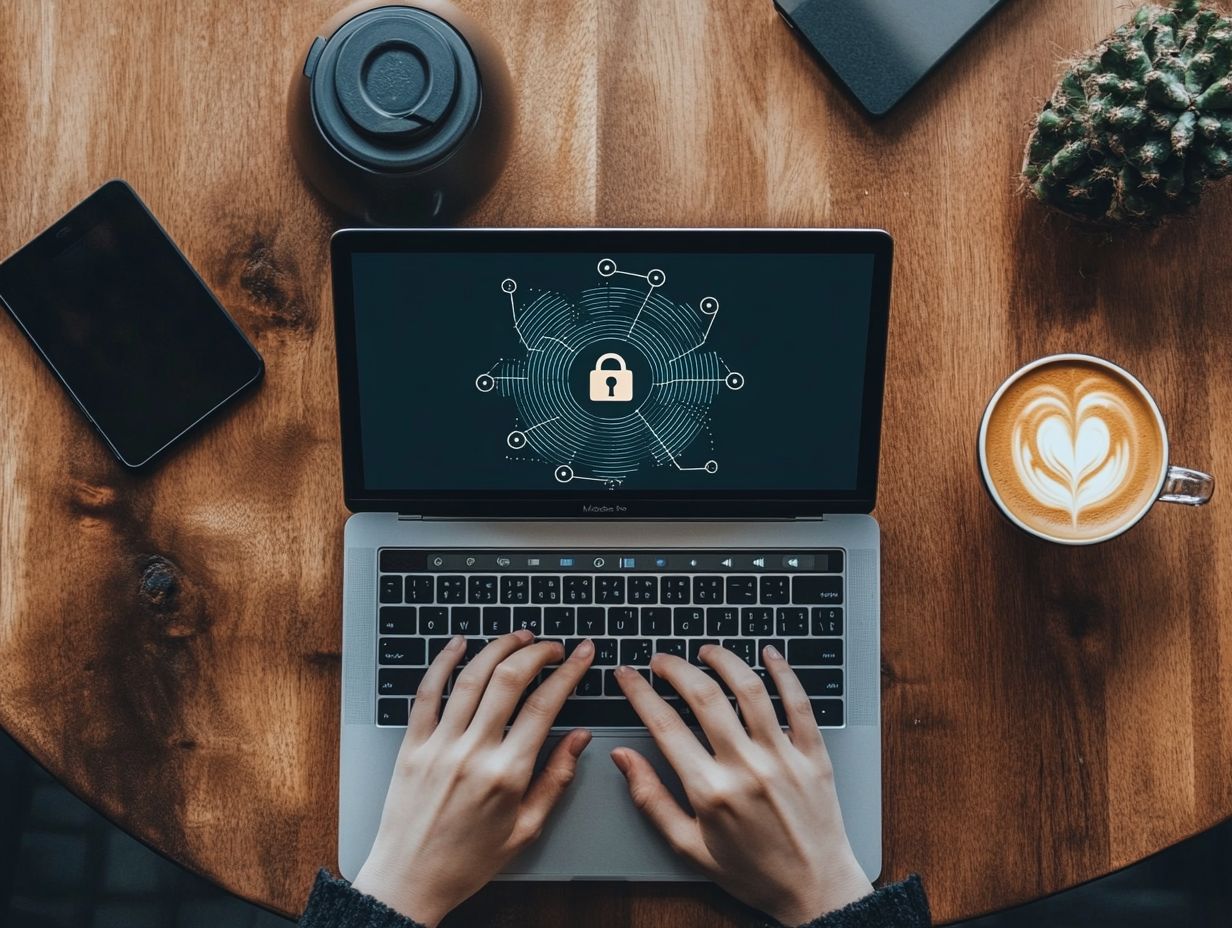
Public Wi-Fi networks are free and convenient. However, they come with risks that can compromise your security and privacy.
Security threats such as hacking, malware, and identity theft are common on public Wi-Fi networks. It s important to take precautions when using them. To protect yourself, use best practices like avoiding sensitive transactions and using a virtual private network (VPN), a tool that keeps your online activity private.
Understanding Public Wi-Fi
Understanding public Wi-Fi is essential in today s digitally interconnected landscape. You often find yourself accessing networks in locations like airports, restaurants, libraries, hotels, and cafes.
The convenience and accessibility it offers are undeniably appealing. However, using public Wi-Fi comes with notable security risks, including cyberattacks, attacks where hackers secretly intercept your communication, and the potential for malware distribution.
As unencrypted networks become increasingly common, it s imperative to stay vigilant about your online security and privacy.
What is Public Wi-Fi?
Public Wi-Fi is your ticket to wireless internet access in various public locations. It effortlessly connects you to open access points that accommodate multiple users.
These networks often grace places like cafes, libraries, airports, and parks, ensuring digital connectivity is always at your fingertips, no matter where you are.
You ll likely encounter network names that are refreshingly straightforward, such as ‘Free Wi-Fi’ or ‘Public Network,’ clearly indicating their availability.
Public Wi-Fi connects you to emails, social media, and more. It s a lifeline for remote workers and travelers who want to stay connected with loved ones and colleagues.
By facilitating seamless access to information and services, it plays a critical role in navigating today s fast-paced world.
Benefits of Using Public Wi-Fi
Using public Wi-Fi presents a wealth of advantages, especially where connectivity is paramount.
The freedom to access the internet for free in venues like cafes, hotels, and airports boosts your productivity. It also leads to considerable savings for both travelers and professionals.
This effortless connectivity enables you to remain engaged without being tied solely to mobile data plans.
Convenience and Cost Savings
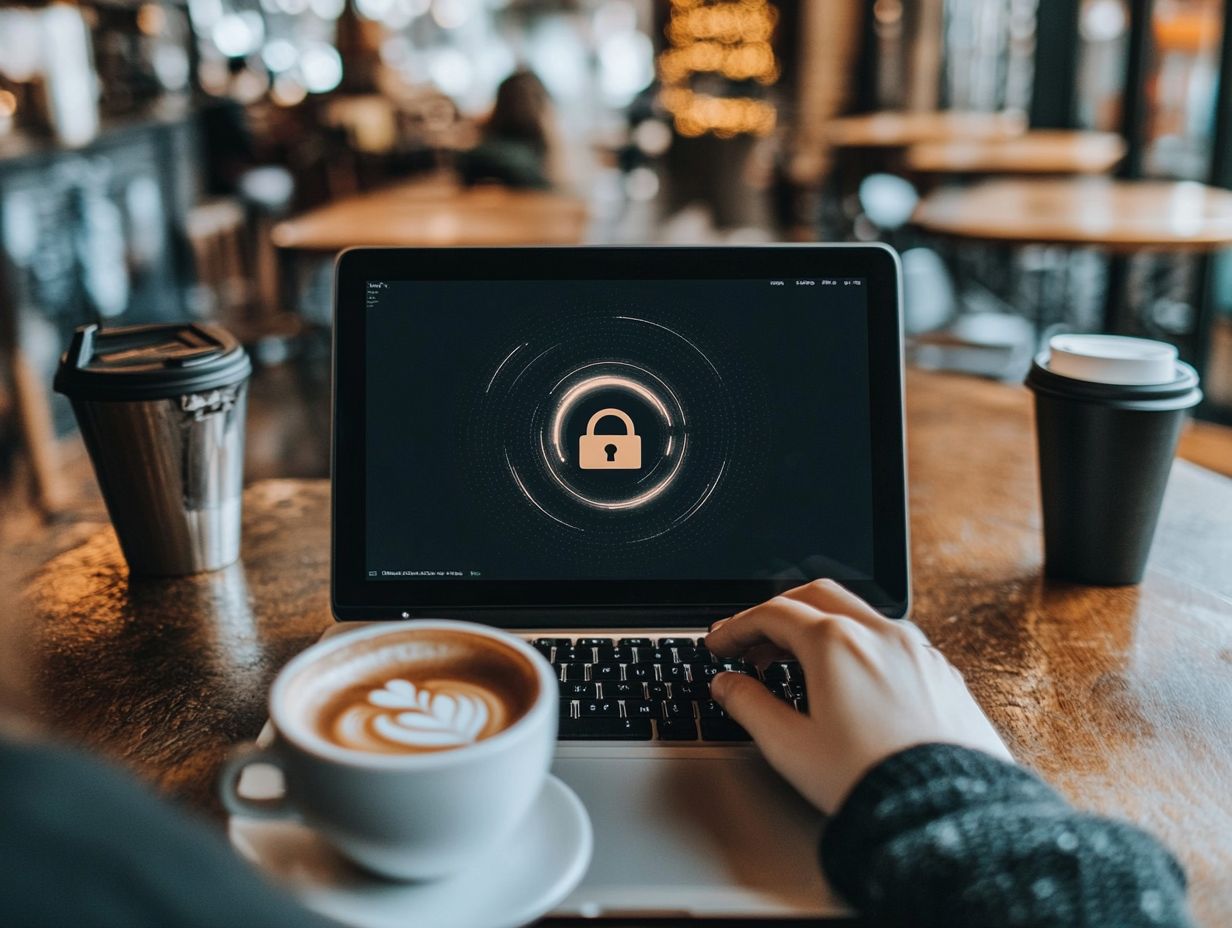
Public Wi-Fi provides unmatched convenience and accessibility. It allows you to connect to the internet for free in a variety of public spaces.
This capability significantly enhances your online experience, especially if you rely on mobile devices for work and leisure.
By eliminating the need for expensive cellular data plans, this service becomes a valuable asset for managing expenses wisely.
The ability to browse, stream, or check emails while on the go enables you to maintain productivity and stay connected without being tied to your home or office network.
This level of flexibility enriches your social life and ensures that essential information is always just a click away, no matter where you find yourself.
Risks of Using Public Wi-Fi
While the advantages of utilizing public Wi-Fi are abundant, it s crucial to recognize the array of risks that come with it.
Significant security threats, including cyberattacks, attacks where hackers secretly intercept your communication, and malware distribution, lurk in the shadows. The widespread presence of unencrypted networks leaves users vulnerable to serious dangers that could result in identity theft or other security breaches.
Security Threats
Security threats in public Wi-Fi networks can feel daunting. They expose you to Wi-Fi snooping, fake Wi-Fi networks, and rogue access points.
These vulnerabilities have serious implications, especially as you increasingly rely on unsecured connections for sensitive transactions like online banking and personal communications. Hackers use various tactics to intercept your data, putting your personal information at risk without your knowledge.
Fake Wi-Fi networks often masquerade as legitimate ones, enticing unsuspecting users to connect. This allows attackers to capture sensitive data. Understanding these threats is crucial for anyone using public Wi-Fi.
Don t wait! A virtual private network (VPN) is a must-have to keep your data safe. Avoid accessing sensitive information on public connections, and ensure your devices have up-to-date security software.
By taking these proactive measures, you can bolster your protection against the heightened risks that come with public Wi-Fi usage.
Privacy Concerns
Using public Wi-Fi can be a double-edged sword, raising significant privacy concerns especially for your sensitive information and guarding against identity theft from phishing attempts.
When you connect to unsecured networks in cafes, airports, or libraries, you might unknowingly place yourself in the crosshairs of cybercriminals who thrive in these environments. These attackers can intercept any data transmitted over the network, making it easy for them to snatch your passwords, bank details, and personal information.
You could encounter fake networks mimicking legitimate ones, luring you into traps and guiding you to deceptive login pages. It s essential to stay informed about these threats, adopt strong password practices, and consider using a VPN to strengthen your connections.
By being vigilant and proactive, you can greatly reduce your vulnerability to identity theft and other phishing scams while using public Wi-Fi.
How to Protect Yourself on Public Wi-Fi
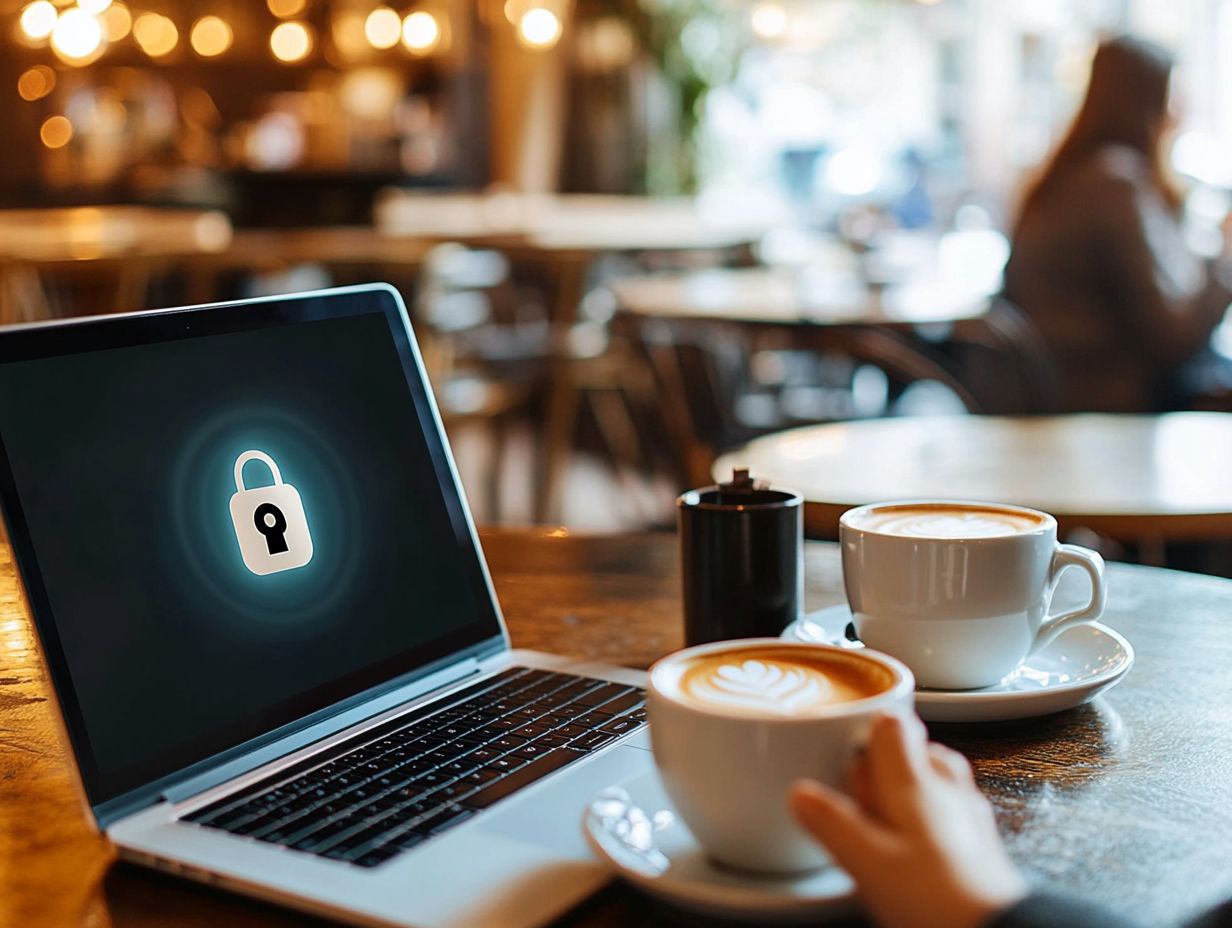
To safeguard yourself on public Wi-Fi, adopting effective cybersecurity strategies can significantly reduce your risk of encountering cyber threats.
Use a VPN and connect only to HTTPS websites to ensure secure connections. Using tools like privacy screens and two-factor authentication is crucial.
Trustworthy antivirus software adds essential layers of protection against potential security breaches.
Best Practices and Tools
Adopting best practices and utilizing reliable tools like VPNs and antivirus software can significantly enhance your online security, especially on public Wi-Fi.
In addition to leveraging these tools, avoid conducting sensitive transactions like online banking or shopping on unsecured networks. Instead, choose well-known and trusted networks to reduce the risk of interception.
Regularly updating your antivirus software protects your devices from malware and provides real-time defense against emerging threats. Consider enabling your firewall settings for extra protection.
By taking these precautions, you can navigate the digital landscape confidently, knowing your personal information is better protected from potential cyber threats.
Alternatives to Public Wi-Fi
While public Wi-Fi may be tempting due to its convenience, consider several superior alternatives for secure internet access.
Utilizing private encrypted networks or mobile hotspots delivers more reliable connections and significantly enhances your online security, safeguarding you from the risks tied to unencrypted public networks.
Take control of your online safety today!
Other Options for Internet Access
Consider alternatives to public Wi-Fi, such as encrypted networks and mobile hotspots. These options offer better security and reliability.
Using these options lets you browse the web with extra protection against threats like data breaches and identity theft.
Encrypted networks use strong security measures to keep your personal information safe during online transactions. In contrast, public Wi-Fi often lacks proper authentication, which can expose you to cyberattacks.
Personal hotspots provide the convenience of internet access without the risks of shared networks. Enjoy safe and private connectivity while on the go!
Frequently Asked Questions

What are the risks of using public Wi-Fi?
Using public Wi-Fi puts your personal information at risk from hackers. They can access your passwords, credit card numbers, and other sensitive data.
Can my device get infected with malware from public Wi-Fi?
Yes, public Wi-Fi networks are often unsecured. Cyber criminals can easily install malware on your device without your knowledge, putting your data at risk.
What security measures can I take on public Wi-Fi?
Use a virtual private network (VPN) to encrypt your data and protect against hackers. Keep your device’s firewall on and avoid accessing sensitive information.
Is using public Wi-Fi safe for online banking and shopping?
No, it is not safe to use public Wi-Fi for online banking or shopping. Hackers can intercept your information for fraudulent activities.
Can someone access my messages and calls on public Wi-Fi?
If your messaging or calling app lacks end-to-end encryption, yes, someone could access your messages and calls. Use secure messaging apps or a VPN for better protection.
Are all public Wi-Fi networks equally risky?
No, some public Wi-Fi networks have better security than others. However, it s best to be cautious and avoid accessing sensitive information on any public Wi-Fi.

